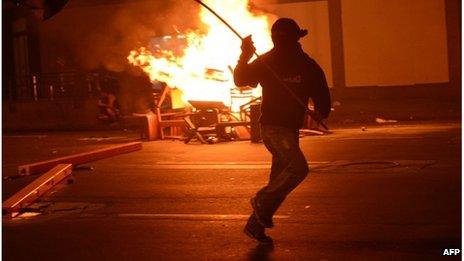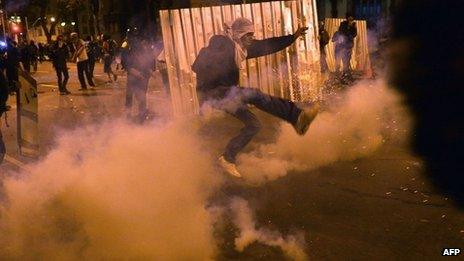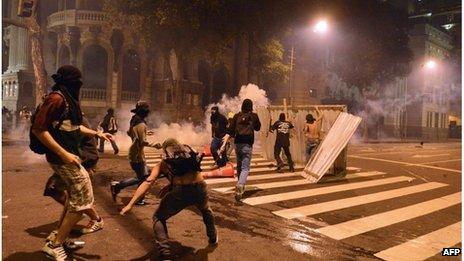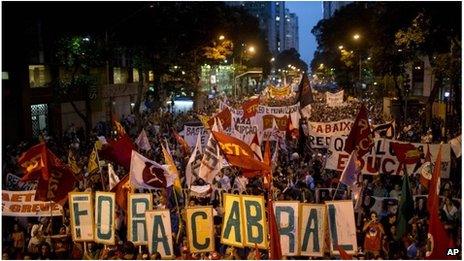Clashes after teachers protests in Rio and Sao Paulo
- Published
Brazil protests
Protesters have clashed with the police in Brazil's largest cities, Rio de Janeiro and Sao Paulo, after marches in support of striking teachers.
Soon after a peaceful march by more than 5,000 people ended in Rio, a much smaller masked group attacked shops, set fire to a police car and threw petrol bombs.
There were also clashes in Sao Paulo, where shops were ransacked.
Police responded with tear and pepper gas and detained dozens of people.
Four officers were injured and seven banks were vandalized during the unrest in Sao Paulo, according to Reuters news agency.
Extra police had been deployed in Rio de Janeiro for the huge protest coinciding with Teacher's Day, on which the country recognises the profession.
Many shops and banks had boarded up their windows after last week's larger protests, which had gathered more than 10,000 supporters.
Police also cordoned off the Rio house of representatives, which was targeted last week.
'Right to strike'
After the end of Tuesday's march, masked protesters from the so-called Black Bloc anarchist group set fire to the boards, as well as public telephones, rubbish bags and other street furniture.
Metal boards were also taken by some groups and used as shields to confront the police.
A police car was set alight and protest slogans written on walls.
Teachers in Rio are demanding better working conditions and salaries and have the support of colleagues in other cities.
They have been on strike for two months and many complained that Rio's state government had started procedures to sanction the striking teachers.
But on Tuesday night, a Supreme Court judge said it considered the government's actions illegal.
Judge Luiz Fux told Brazil's state news agency, Agencia Brasil, that the sanctions infringed, "even if in a roundabout way, the civil servants' right to freedom of expressions through strike".
Mr Fux also summoned union leaders and government officials for talks on 22 October.

Protesters set fire to a number of objects on the streets

Metal boards were taken off shop windows and used as shields against the police

Protesters confronted the police again on the streets of Rio de Janeiro

Thousands of people showed their support to striking Rio de Janeiro teachers
In an earlier demonstration on Tuesday, a group of homeless people tried to break into the house of representatives of Sao Paulo.
Police held off the crowd, and a small group later met with government officials.
In the south-eastern city of Belo Horizonte, a peaceful protest was held a central square.
Smaller groups also gathered on Tuesday in Brasilia, the north-eastern city of Salvador and other cities.
Brazil's security situation is a challenge to cities that will play host to the 2014 World Cup and 2016 Olympic Games.
- Published8 October 2013
- Published8 October 2013
- Published12 July 2013
- Published27 July 2013
- Published8 September 2013
- Published2 October 2013